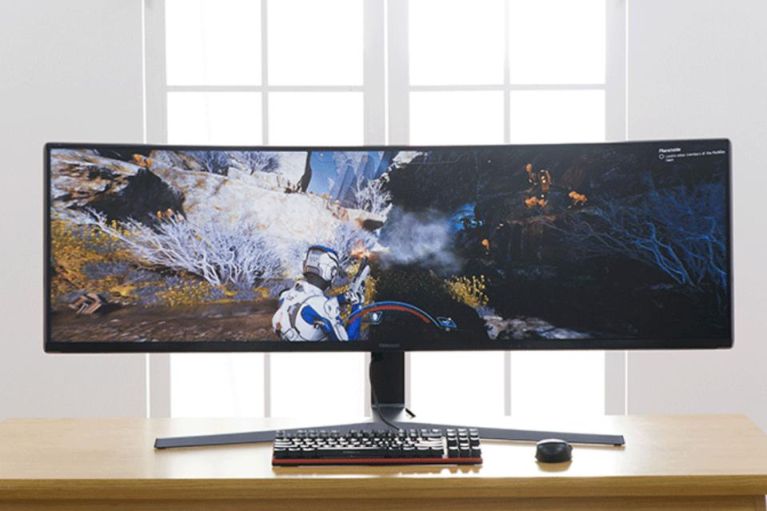Are you a gamer looking for a new screen? Do you enjoy movie marathons and need a new screen to watch them on? Often, people struggle to choose between a television and a monitor. There are so many shapes and sizes now that the two devices are blurring together.
But there is a difference between televisions and monitors. Let’s take a look at what they are so that you can choose the right one for your needs.
What Do you Want to Use it for?
Most of the time, a television and monitor can do the same jobs. For instance, you can play games on both of these devices, as well as watch movies, browse the internet and even video call your friends and family. But while they can do all of these things, they have their own friends that mean they can do things better than the other.
For example, when it comes to watching television series and movies, you will find that a television can perform better. You can enjoy a bigger screen, high resolution videos and have a better overall experience with your family. But when it comes to playing games, a monitor can have the features you want for no lag, fun gaming sessions.
Therefore, before you start to look at the specifications of televisions and monitors, you need to think about what you want the device for. Then you can look and find the best option for your needs.
Factors to Consider
Once you know what you are going to use the screen for, you can start shopping for a television or monitor. But you will soon realize that there are a lot of options out there. In fact, it can be difficult to know where to begin. We have rounded up some of the biggest factors you need to consider when you are buying a new TV or monitor.
The Size
The size is something important that you want to consider. Some people prefer to watch on a large screen and feel like they are part of the experience. Other people will prefer the screen to be smaller and close to them so that they can feel like they see every detail with a monitor.
Often, you will find that the average size of a monitor varies from between 21 to 32 inches. Televisions are much larger and you can browse sizes of 32 to 65 inches. Of course, the larger the screen, the more money you can expect to pay.
In addition, something to think about when it comes to size is where you are going to put your new device. Monitors are very limited in that they were designed to be placed on a table or desk. Thus, you will need an available surface where you can put your monitor. On the other hand, while TVs are bigger, they are also more versatile. You can place them in a TV stand, table or mount them on your wall.
Screen Resolution
One thing to remember is that you can have the biggest screen in the world but if it does not have good screen resolution, you may struggle to have a good experience. For example, televisions are now available in full HD or 4K UHD resolutions. Both are good choices and can provide a lot of color and detail for watching movies and television series.
The screen resolution on monitors is going to be slightly different. Instead, you are going to be dealing with pixel density. You can still have a good experience for gaming on a monitor but you will have to pay attention to the pixel density. In particular, you will want 110 pixels per inch for the best viewing experience.
The Price
The price is always going to be an important factor in your buying decisions. You may already have a budget or price that you want to pay in your head. So, you will need to shop around and see if there are televisions and monitors that are going to suit you, taking everything into account that we have already discussed.
Generally, there are going to be cheap options for both televisions and monitors. Often, televisions can range from around $100 upward. A monitor can also range from around $300 upward depending on what it can offer. The big factors that are going to affect the price you pay are going to be:
- The size of the screen
- The features it has
- The Resolution
- Type of Screen
- Available inputs
One of the rules we always say is that you get what you pay for. In other words, it is not always the best decision to purchase a very cheap monitor or television. Often, the features or graphics are going to reflect this price tag. However, that does not always mean that the most expensive screen on the market is going to be the best one for you either. You need to think about what your priorities are and what you are going to be using the screen for. Then you can find an option that is within your budget.
Refresh Rate
If you are going to be gaming, you want to find out the refresh rate. This is going to play an important part in your gaming experience. It will make your game immersive and responsive, ensuring there is no motion blur. Often, the refresh rate will be shown in Hertz. Ideally, on a monitor, you want to look for 144 to 240 Hertz. This is going to be very responsive and allow you to play all types of games.
You may find that televisions do not always state their refresh rate. You might have to do some digging for this information. But some modern televisions will if they think that they will appeal to gamers. You want to look out for 120 to 240 Hertz. But they do not always use the same technology as monitors, which can low the responsiveness.






![YouTube SEO in 2024 [Definitive Guide]](https://getpixie.com/wp-content/uploads/2024/02/shutterstock_1684828252-1-150x150.jpg)








